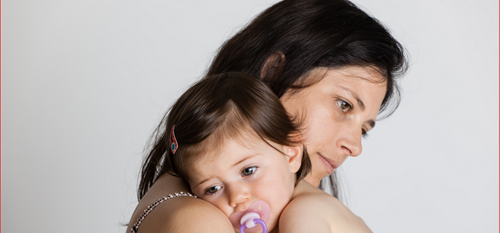
The transition to motherhood is an important developmental period in a woman’s life. During this time, women go through many transitions and redefine many aspects of their lives, including their identity, their body, their relationships with significant others and their role as a mother.
When one is expecting a baby, there is a social expectation that you will be elated, and that the excitement about having a baby will overpower the stress and anxiety that comes with childbirth and child rearing. After the birth of a baby, women tend to feel many different emotions: excitement and happiness, as well as fear and anxiety.
These are normal emotions, but with less sleep and adjusting to an infant, they can be overwhelming. But what happens when the "baby blues" tend to last longer than just a couple of days, if the feelings become more intense, and coping becomes more and more difficult? Postnatal depression occurs more often than one would expect, and although many women experience symptoms, it remains a largely unmentioned phenomenon. Very few sufferers seek help, or even admit to those closest to them that they need help.

According to the Diagnostic and Statistical Manual of Mental Disorders Fifth Edition (DSM-5), between 3% and 6% of women will experience the onset of depressive symptoms during pregnancy – and up to 50% of women who develop postpartum depression actually experience depressive symptoms during pregnancy. Collectively these symptoms are referred to as peripartum episodes. Research has shown that women who experience mood and anxiety symptoms during pregnancy and who experience the “baby blues” are at higher risk for developing a postpartum major depressive episode.
In severe cases, women can develop psychotic symptoms as well as mood symptoms. It is estimated that 1 in 500 to 1 in 1,000 women can develop psychotic symptoms in conjunction with the mood symptoms. The risk of developing psychotic symptoms is higher for women who have had previous postpartum depressive episodes, who have previously been diagnosed with a depressive or bipolar disorder, or if there is a family history of depressive and/or bipolar disorders.
Motherhood is often associated with a mix of feelings: warmth and joy, as well as sadness, loss and anxiety. As mentioned, the feelings associated with the "baby blues" are normal, and can range from feeling sad or anxious to irritability, crying, difficulty sleeping and difficulty concentrating. These tend to last for a few days up to one or two weeks. However, if these symptoms become more intense, last longer, and the feelings start interfering with your ability to cope and manage your daily tasks, it is advisable to seek help from a professional as soon as possible.
Symptoms of postpartum depression include:
- Depressed mood for most of the day, nearly every day
- Feeling irritable or angry
- Feeling numb and empty
- Diminished interest in activities that you used to find enjoyable
- Loss of appetite and weight loss
- Insomnia or hypersomnia (increased sleep)
- Feeling tired and fatigued; loss of energy
- Feelings of worthlessness, shame or guilt
- Difficulty concentrating or making decisions
- Thoughts of harming yourself, and/or your baby, or just wanting to disappear
There is no one single cause of postpartum depression, but there are a few factors that can contribute:
- During and after childbirth, there are a lot of physical changes women experience. Hormone levels change and blood pressure may drop, which can all contribute to tiredness and a lack of energy.
- Emotional factors can also contribute, e.g. feeling anxious about having a baby, your ability to care for an infant, changes in a romantic relationship, changes in body image, financial stresses, lack of support and stressful relationships can impact on the emotional wellbeing of a new mother.
- A history of depression or bipolar disorder, or a family history of depression or bipolar disorders can contribute to the development of postpartum depression.
Often women feel shame and embarrassment for not being able to “shake off these feelings,” and sometimes do not understand why they feel the way they do. They do not confide in anyone for fear of judgment and blame, and so often go through this difficult time alone, which can then lead to the depressive feelings becoming worse.
Left untreated, postpartum depression can lead to difficulties in coping and managing day to day tasks, and may interfere with the bonding process between mother and baby. Judgment from others, a lack of social support and strong guilt feelings often prevent women from asking for help. If you recognise any of the symptoms mentioned above, it is important to contact a health professional and seek treatment as soon as possible.
Sources:
American Psychiatric Association. (2013). Diagnostic and statistical manual of mental disorder, 5th Ed., American Psychiatric Publishing: Washington, DC.
Besser, A., Vliegen, N., Luyten, P., & Blatt. (2008). Systemic empirical Investigation of vulnerability to Postpartum Depression from a Psychodynamic Perspective. Psychoanalytic Psychology, 25,2, 392-410
Nikki Themistocleous is a registered Clinical Psychologist.




 Publications
Publications
 Partners
Partners














